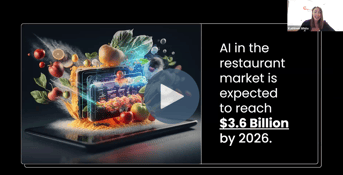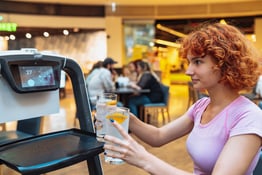Joel Rivas, 45, has been around the restaurant rodeo. He took his first restaurant job at age 17 as a dishwasher, and moved across the front and back of the house until he’d tried practically every role. In those years, he worked long hours. He battled high-stress conditions. And he grew what he calls a “family” of fellow colleagues sweating it out by his side.
It was a typical restaurant experience, says Rivas. But, as all too common in the industry, Rivas also struggled with substance abuse, quickly discovering the toll that restaurant life can take on someone’s mental health.
“It’s a very familial and tribal atmosphere, and the people you work with, because of the hours you keep, are the people you bond with. And there’s a real beauty in that, but in some cases, like mine and many others, there can be a dynamic of enabling,” says Rivas. “In an industry where access to alcohol and drugs is almost unmatched, that can quickly spiral out of control when there’s also a lack of access to mental health resources.”
Rivas got clean, and eventually left the industry to take a job in healthcare, but he kept up a side business doing consulting for restaurant and bar operators. Over the years, as he watched others in the industry struggle with substance abuse and mental health issues, he decided he couldn’t sit back without trying to help.
So in 2017, Rivas launched a nonprofit, Saint City Culinary Foundation, with his first initiative being a wellness program called Heard, designed specifically for people in the food and beverage industry. Today, Heard runs weekly mental health and wellness support sessions over Zoom, as well as face-to-face support groups in a handful of cities.
“This is really the first step for people to dip their feet into talking about things they’re going through and issues they’re having,” says Rivas. “At the core is a focus on normalizing conversations around wellness and taking care of oneself in regards to mental health.”
Heard resources: “Our focus is balance.”
Each Heard support session includes at least one moderator who kicks off the session by talking about a specific topic and relating it to their own lives. Others in the group are then invited to speak about the topic or anything else they may be facing, or simply just listen.
“People moderating it are all part of the industry, and that’s a format that makes people comfortable,” says Rivas. “The moderators are able to know what people are going through and empathize.”
Heard’s weekly Monday night meeting held online through Zoom is its most popular, gathering food and beverage workers from across the country. In-person support groups are held in San Antonio, Austin, and Houston, as well as Baltimore and Washington D.C.
“To hear your story reflected back to you, to realize you're not alone, and to see that other people are seeking and finding solutions, there’s something so empowering about finding that in a community,” says Anna Welker, a Baltimore-based bar manager and also Heard’s online program director. “It’s a confidential, safe space of like-minded people who are trying to better themselves and hold space for others.”
Rivas notes that Heard’s primary focus isn't sobriety and recovery support, but the organization works in tandem with groups like Ben’s Friends and often refers participants to other groups, including Alcoholics Anonymous Heard also works with participants to help find accessible, licensed therapists and psychiatrists local to their area. As for Heard, Rivas’ describes its focus as “balance”.
“We know balance looks different for everyone,” says Rivas. “For some people, that balance is sobriety, for others it’s a matter of needing someone to talk to and implement some wellness into their lives.”
He adds, “At the end of the day, a lot of what it is is just having someone to listen, and ask, ‘How are you? How are you sleeping this week? Did you eat today?’ In the service industry, we’re wired as givers, and we give too much, and it’s become so normalized over generations that we don’t fill that back up for ourselves.”
Wellness resources beyond support groups
Started during the pandemic, Heard also formed a partnership with telehealth group Galileo. Food and beverage workers can sign up to receive 24/7 consults with a doctor for $29 per month.
“A lot of folks don’t have health insurance, and so if they get a respiratory infection, they go to the ER and sit there for eight hours, or try to scrounge up $150 to go to urgent care, or just work sick,” says Rivas. “I started looking for telehealth providers that could provide something accessible.”
Heard also occasionally runs free wellness programs, like running clubs, yoga classes, and rock climbing sessions, in the cities where it’s established in-person support groups. Event announcements are made on social media and through email blasts.
Moving forward, Heard plans to expand to other locations where there aren’t similarly established resources, but it also wants to support organizations that already exist in other cities.
“I don’t by any means want to be the only mental health organization that does this,” says Rivas “There are 11 million hospitality workers – it’s going to take all of us to get the people in the industry the help that they need.”
Part of a bigger picture
When Rivas launched Saint City Culinary Foundation, Heard was never the sole mission.
“The sustainability of the people in our industry is the main focus as a whole,” says Rivas.
Currently, the organization’s working on developing another offshoot called Core, a culinary leadership program that will focus on working with culinary students at the high school level, largely at high need schools.
“We’ll have people in the industry work with classes on leadership skills and team-building and also talk about creating culture,” says Rivas. “When they go into the industry, they’ll have that foundation to fall back on and mentors in their area, and that foundation will help create a more sustainable industry in the long run.”





